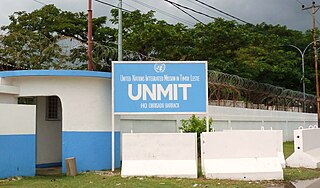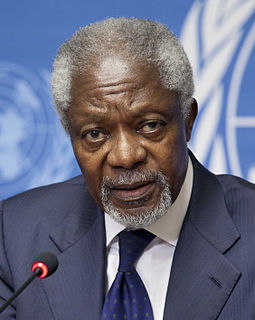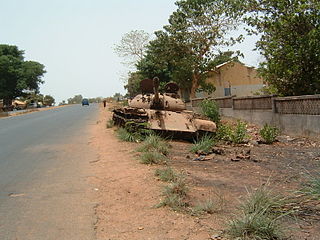
The United Nations Peacebuilding Commission (PBC) is a United Nations Intergovernmental advisory body of both the United Nations General Assembly and the United Nations Security Council that supports peace efforts in conflict affected countries, and is a key addition to the capacity of the international community in the broad peace agenda. It was established in 2005 with the passage of both A/RES/60/180 and S/RES/1645

The United Nations Peacebuilding Support Office in Guinea-Bissau (UNOGBIS) was established by the United Nations Security Council in its Resolution 1233 in April 1999 to facilitate the general election and implementation of the Abuja Accord.

United Nations Security Council resolution 1346, adopted unanimously on 30 March 2001, after recalling previous resolutions on the situation in Sierra Leone, the Council extended the mandate of the United Nations Mission in Sierra Leone (UNAMSIL) for a further six months and increased the size of its military component.

United Nations Security Council Resolution 1938, adopted unanimously on September 15, 2010, after recalling previous resolutions on the situation in Liberia, including resolutions 1509 (2003), 1626 (2005), 1836 (2005) and 1885 (2009), the Council extended the mandate of the United Nations Mission in Liberia (UNMIL) for a further twelve months until September 30, 2011 and required it to provide electoral assistance.

United Nations Security Council Resolution 1941, adopted unanimously on September 29, 2010, after recalling all previous resolutions on the situation in Sierra Leone, particularly Resolution 1886 (2009), the Council extended the mandate of the United Nations Integrated Peacebuilding Office in Sierra Leone (UNIPSIL) until September 15, 2011.

United Nations Security Council Resolution 1949, adopted unanimously on November 23, 2010, after recalling previous resolutions on the situation in Guinea-Bissau, particularly Resolution 1876 (2009), the Council extended the mandate of the United Nations Integrated Peacebuilding Office in Guinea-Bissau (UNIOGBIS) for a further period of one year until December 31, 2011.

The United Nations Integrated Peacebuilding Office in Guinea-Bissau (UNIOGBIS) is a United Nations peacebuilding mission in Guinea-Bissau.

United Nations Security Council resolution 1602, adopted unanimously on 31 May 2005, after recalling resolutions 1545 (2004), 1565 (2004), 1577 (2004) and 1596 (2005) on the situation in Burundi, the Council extended the mandate of the United Nations Operation in Burundi (ONUB) for a period of six months until 1 December 2005.

United Nations Security Council Resolution 1608, adopted unanimously on 22 June 2005, after recalling resolutions 1542 (2004) and 1576 (2004) on the situation in Haiti, the Council extended the mandate of the United Nations Stabilisation Mission in Haiti (MINUSTAH) until 15 February 2006 and increased its strength.

United Nations Security Council Resolution 1969 was adopted unanimously on February 24, 2011; after reaffirming resolutions 1599 (2005), 1677 (2006), 1690 (2006), 1703 (2006), 1704 (2006), 1745 (2007), 1802 (2008), 1867 (2009) and 1912 (2010) on the situation in East Timor (Timor-Leste), the Council decided to extend the mandate of the United Nations Integrated Mission in Timor-Leste (UNMIT) for a year, until February 26, 2012.

United Nations Security Council Resolution 1650, adopted unanimously on 21 December 2005, after recalling Resolution 1545 (2004) regarding the situation in Burundi, the Council extended the mandate of the United Nations Operation in Burundi (ONUB) until 1 July 2006.

United Nations Security Council Resolution 1711, adopted unanimously on September 29, 2006, after recalling all previous resolutions concerning the situation in the Democratic Republic of the Congo, including resolutions 1565 (2004), 1592 (2005), 1596 (2005), 1621 (2005), 1628 (2005), 1635 (2005), 1671 (2006) and 1693 (2006), and resolutions 1650 (2005), 1669 (2006), 1692 (2006) on the situation in Burundi and the African Great Lakes region, the Council extended the mandate of the United Nations Mission in the Democratic Republic of Congo (MONUC) until February 15, 2007.

United Nations Security Council Resolution 1712, adopted unanimously on 29 September 2006, after recalling all previous resolutions on the situation in Liberia and West Africa, particularly resolutions 1509 (2003), 1667 (2006) and 1694 (2006), the Council extended the mandate of the United Nations Mission in Liberia (UNMIL) for six months until 31 March 2007.

United Nations Security Council Resolution 1734, adopted unanimously on December 22, 2006, after recalling all previous resolutions on the situation in Sierra Leone, including resolutions 1620 (2005) and 1688 (2006), the Council renewed the mandate of the United Nations Integrated Office in Sierra Leone (UNIOSIL) until December 31, 2007.
United Nations Security Council Resolution 1793 was unanimously adopted on 21 December 2007.
United Nations Security Council Resolution 1876 was unanimously adopted on 26 June 2009.
United Nations Security Council Resolution 1885 was unanimously adopted on 15 September 2009.

United Nations Security Council Resolution 2030 was unanimously adopted on 21 December 2011 after recalling resolution 1949 (2010). The Council called on the Government and political stakeholders in Guinea-Bissau to work together to consolidate peace and stability, use legal and peaceful means to resolve differences and intensify efforts for genuine and inclusive political dialogue and national reconciliation.



















